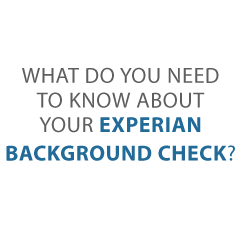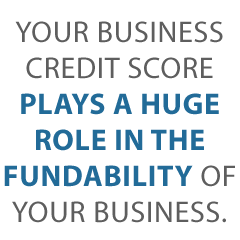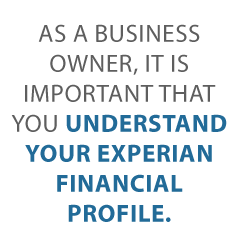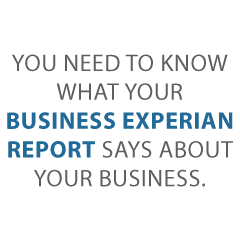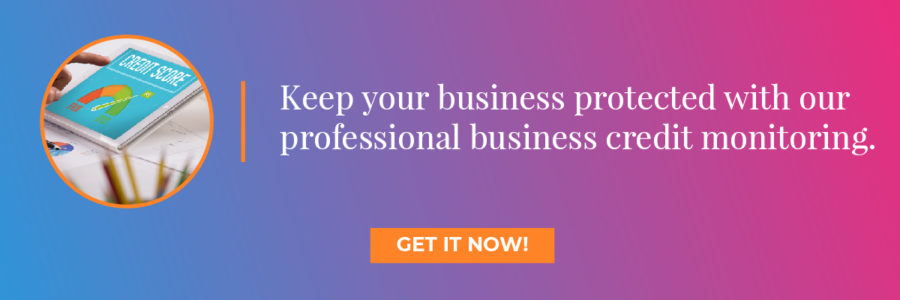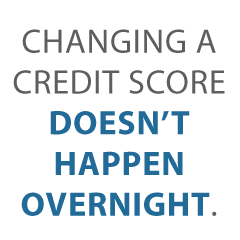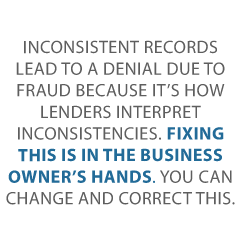
What is Your Experian Credit Report All About?
Did You Want to Learn About Your Experian Credit Report?
This is a terrific time to learn about your Experian credit report.
But first we should start with some definitions and background on business credit.
Business Credit
This is credit in the name of a business. It is not tied to the creditworthiness of its owner or owners. Rather, business credit scores depend on how well a company can pay its bills. Hence consumer and business credit scores can vary dramatically.
Business Credit Benefits
Also, there are no demands for a personal guarantee. You can quickly get business credit regardless of personal credit quality. And there is no personal credit reporting of business accounts. Business credit utilization won’t affect your consumer FICO score. Also, the business owner won’t to be personally liable for business debts.
Business Credit Details
Getting business credit is not automatic. Building business credit requires some work. Some of the steps are intuitive. But some of them are not.
Fundability
Fundability is the current ability of our business to get funding. Some factors are in your control. Others (like your time in business) are not. Your online presence and data are one area which is at or close to 100% with your control.
Business Credit, Fundability, and Business Funding Applications
The better your business credit and fundability are, the more likely you will get approval for business financing.
Lenders Use Data to Decide on Your Application
They check information from a variety of sources, and they do not tell you about any of them. Knowing what these secret sources measure can only help you. Understanding what matters the most makes getting a loan A LOT easier, because you know what to improve first. This information is the difference between getting an approval and getting a denial.
Records Congruency
Keep your records consistent! This includes your online records. Lenders and business credit bureaus are looking at everything, so it had better match.
Inconsistent records lead to a denial due to fraud because it’s how lenders interpret inconsistencies. Fixing this is in the business owner’s hands. You can change and correct this.
This means your business name, address, phone number – everything! – must look the same in these places and more:
- Every place your business has an online presence (your website, Yelp, SoTellUs, etc.)
- IRS records
- Records with Dun & Bradstreet, Experian, and Equifax
- All licenses needed to run your business
- Incorporation documents
Copy/paste this information; do not chance it with retyping.
There are Three Major Credit Bureaus – But What Makes Your Experian Credit Report so Different?
What distinguishes the three different main credit bureaus? Why is your Experian credit report such an outlier? And can you use this information to your advantage?
Business Credit Reporting Agencies
There are three different large credit bureaus for business: Dun & Bradstreet, Experian, and Equifax. FICO SBSS and CreditSafe are also players.
In the business world Equifax and Experian are up there, but it is Dun & Bradstreet which is the major player.
Dun and Bradstreet has more than 10 times the records of the next closest reporting agency. In the business credit world there really is one major player, with two other much smaller ones. See dnb.com/about-us/company.html. It makes sense to start with Dun and Bradstreet when comparing the business CRAs. This is because you’ll have to start the business credit building process with them anyway.
Dun & Bradstreet
Dun and Bradstreet is the oldest and largest credit reporting agency. Go to Dun and Bradstreet’s website and look for your business, at dnb.com/duns-number. Can’t find it? Then get a free D-U-N-S number. You will always need a D-U-N-S number to start building business credit. Go here to get a D-U-N-S number: dnb.com/duns-number/get-a-duns.html.
A D-U-N-S number is how Dun and Bradstreet gets your company into their system. And a D-U-N-S number plus 3 payment experiences leads to a PAYDEX score. A payment experience is a record of a purchase from a business which reports to a credit reporting agency. In this case, Dun and Bradstreet. Once you are in Dun and Bradstreet’s system, search Equifax and Experian’s sites for your business. You can do so at creditsuite.com/reports.
Keep your business protected with our professional business credit monitoring.
Experian Business Credit
Business credit is in a business’s name, and it depends on how well a company can pay its bills. But Experian uses both consumer and business credit data to gauge risk.
“By combining personal and commercial credit information in one report, Experian provides a complete picture of the creditworthiness of small businesses”
You Will Need to Get Set Up with Experian
Get a BIN (Business Identification Number) from Experian. Experian’s BizSource assigns a BIN.
How Long Data Stays on Your Reports at the Different Credit Bureaus
Per Experian Business, bankruptcies stay for 7 to 10 years on your Experian credit report. Chapter 13 bankruptcy rolls off your credit report 7 years from the filing date. While Chapter 7 bankruptcy stays for 10 years from the filing date. Trade data stays on for 36 months. Judgments, collections, and tax liens stay on for 6 years and 9 months. UCC filings stay on for 5 years. See experian.com/small-business/how-long-credit-report. There are similar time frames for the two other main credit bureaus.
Let’s Look at an Experian Credit Report
We’ll look at a Typical Experian Business Credit Advantage SM Report. Experian provides a sample report where you can get an idea of what to expect. Experian changes its reports at times. So the best, most accurate and up to date source for this information is the Experian website. Find it online at https://sbcr.experian.com/pdp.aspx?pg=Sample-BCAI&hdr=report.
Business Background Information
The first part of a report contains:
- Name
- Address
- Main phone number
- Experian BIN
- Annual sales
- Business type (corporation, etc.)
- Date Experian file established
- Years in business
- Total number of employees
- Incorporation date and state
Experian Business Credit Score
Business Credit Scores range from 1 to 100. Higher scores indicate lower risk. This score predicts the chance of serious credit delinquencies in the next 12 months. It uses tradeline and collections data, public filings as well as other variables to predict future risk. This section of the report has a graph to visually indicate the score.
Key Score Factors:
- Number of commercial accounts with terms other than Net 1-30 days
- The number of commercial accounts that are not current
- Number of commercial accounts with high utilization
- Length of time on Experian’s file
Experian Financial Stability Risk Rating
Financial Stability Risk Ratings range from 1 to 5. Lower ratings indicate lower risk. A Financial Stability Risk Rating of 1 indicates a 0.55% potential risk of severe financial distress. So this is in the next 12 months.
Experian puts all businesses in one of the five risk segments. This rating predicts the chance of payment default and/or bankruptcy, in the next 12 months. This rating uses tradeline and collections information, public filings, and other variables to predict future risk.
Key Rating Factors:
- Number of active commercial accounts
- Risk associated with the business type
- Risk associated with the company’s industry sector
- Also, the employee size of business
Credit Summary
This section contains several counts of various data points. For the most part, the details are available further into the report.
The information outlined contains:
- Current Days Beyond Terms (DBT)
- Predicted DBT for a particular date
- Average industry DBT
- Payment Trend Indicator (stable, or not)
This section also contains:
- Lowest 6 month balance
- Highest 6 month balance
- Current total account balance
- Highest credit amount extended
- Median credit amount extended
- Number of payment tradelines
- How many lender consortium experiences
- Number of business inquiries
- Also, the number of UCC Filings
More on the Credit Summary
This part also contains:
- Number of Banking/Insurance/Leasing
- A percentage of businesses scoring worse than the company outlined in the report
- Number of bankruptcies
- How many liens
- Number of judgments filed
- Number of accounts in collections
- Also, the company background
Company background includes information on founding date, and where the company’s headquarters are. Also, there’s a basic background of what the business does.
Payment Trend Summary
This section starts with two graphs. They show the company in question versus its industry on Monthly payment trends and Quarterly payment trends.
These are the percentages of on-time payments by month and quarter, respectively.
This part then shows tables with recent payment information by month and quarter. Then there are three more graphs:
- Continuous Payment Trends: continuous distribution with DBT (days beyond terms)
- Newly Reported Payment Trends: newly reported distribution with DBT
- Combined Payment Trends: combined distribution with DBT
Trade Payment Information
This next part shows details on payment experiences (financial trades). There is also data on lender consortium experiences (financial exchange trades):
- Tradeline experiences (continuous trades)
- Aged trades
- Payment trend detail
- There is also a link to send any missing payment experiences
Keep your business protected with our professional business credit monitoring.
Inquiries, Collection Filings, and Collections Summary
The Inquiries part contains the industry making the inquiry and a total made during a given month. The Collection Filings sector has the date, name of the agency, and status (open or closed). If a collection is closed, the Collection Filing sector also contains the closing date. The Collections Summary shows: status, number of collections, dollar amount in dispute, and amount collected (even if $0).
Commercial Banking, Insurance, Leasing
For leasing, this section shows:
- Leasing institution name and address
- Product type
- Lease start date and term
- Original and remaining balances
- The scheduled amount due
- And the number of payments per year
- Also, the number of payments which are current, late, or overdue
Judgement Filings
This sector includes:
- Date and plaintiff
- Filing location
- Legal type and action
- Document number
- Also, liability amount
This sector includes cases where the company in the report is the plaintiff or the defendant
Tax Lien Filings
This part has:
- Date and owner
- Filing location
- Legal type and action
- Document number
- Liability amount
- Also, description
UCC Filings
This section has:
- Date
- Filing number
- Jurisdiction
- Secured party
- Also, Activity (filed, or not)
Keep your business protected with our professional business credit monitoring.
UCC Filings Summary
This part shows:
- Filing period
- Number of cautionary filings
- Total filed
- The total released
- Total continued
- Also, Amended/Assigned
Cautionary UCC Filings include one or more of the following collateral:
- Accounts
- Accounts receivable
- Contracts
- Hereafter acquired property
- Leases
- Notes receivable, or
- Proceeds
Score Improvement Tips
Experian offers suggestions on how to improve your reports, such as:
- Getting net-30 terms, if possible, from existing and future tradeline suppliers
- Paying accounts on time or working with the tradeline supplier to work out a payment plan so a business is not reported delinquent
- Lowering credit utilization
- Also, making sure all the information in the report is correct
Disputing Issues with Your Experian Business Credit Report
None of the different business bureaus will change your scores without proof. They are starting to accept more and more online disputes. But include proofs of payment with it. These are documents like receipts and cancelled checks.
Fixing credit report errors also means you specifically spell out any charges you challenge. Make your dispute as crystal clear as possible. If you need to snail mail anything in, then use certified mail. This is so you have proof you sent in your dispute. Also, be specific about the concerns with your report.
You can correct Experian issues at: experian.com/small-business/business-credit-information.
Monitoring Your Experian Credit Report and Scores
The costs of monitoring at all three big business credit reporting agencies can add up fast. At Experian, your best (least expensive) bet would be a Business Credit Advantage. Subscription Plan. It currently costs $189 per year. See sbcr.experian.com/pdp.aspx?pg=Sample&link.
Monitor Business Credit at D&B, Experian, and Equifax for Less
Experian’s reports are expensive! But did you know you can get business credit monitoring for all 3 of the big business CRAs, and all in one place – for less? Credit Suite offers monitoring through its Business Finance Suite (through Nav). See what credit issuers and lenders also see, so you can directly improve your scores and get the business credit & funding you need. See suitelogin.com and creditsuite.com/monitoring.
Improving Your Company’s Experian Credit Report
Make sure vendors are reporting your payments, and not just with Experian. Pay bills early or on time, in full. For Experian, historical behavior (payment history) = 5-10% of total score. Try to maintain your personal credit utilization at about 20 – 30% of your limits or less. Don’t close positive accounts even if you no longer use them. And try to avoid derogatories like liens.
Your Experian Credit Report: Takeaways
Experian has revamped their reports dramatically. Also, this major business credit reporting agency is committed to correct data, and to helping companies improve their reports. So to monitor Experian, Equifax, and Dun and Bradstreet for a lot less, monitor through Credit Suite!
The post What is Your Experian Credit Report All About? appeared first on Credit Suite.





